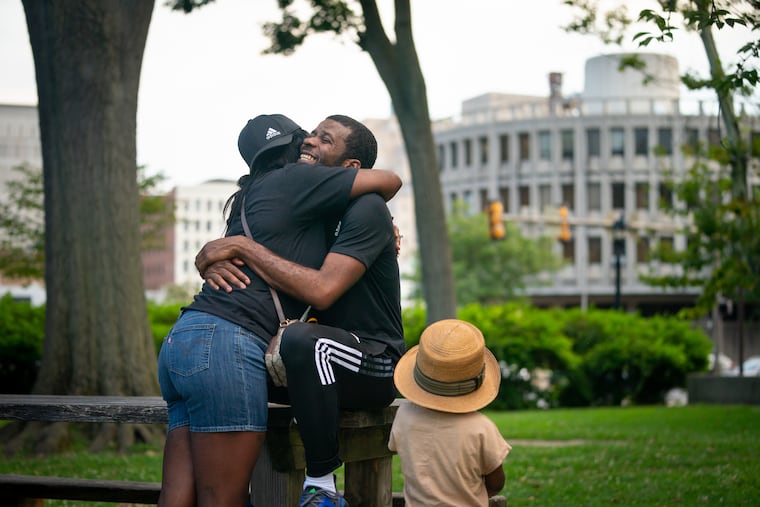Three years. Two trials. No witness. Philly man acquitted of murder says his case shows a flawed system.
“I got to see the worst conditions a prison could ever deliver," said Tremell Foster, 37, who was acquitted of killing his friend. "I been blessed to catch the door before it slammed shut on me.”

As the jury foreman read the verdict of “not guilty” on all charges — and some beaming jurors even flashed a “thumbs-up” in court — it was all Tremell Foster could do to keep himself upright and his emotions contained.
Those two words meant that Foster, 37, was free after three years in jail and two trials for the murder of the man he described as his closest friend, Tyrone Sturgis Jr. The 29-year-old father of four was gunned down in a North Philadelphia schoolyard in 2013.
In Foster’s view, the trial, which lasted just a couple days and ended last week, showed that many issues that have led to recently overturned murder convictions persist.
“They take everything from you: your job, your kids,” he said. “You go to jail first, and then they figure it out while you’re there. That’s spooky. It gives the [authorities] a lot of power.”
The sole witness who accused Foster of the murder, a friend of Sturgis’ named Rakym Dyer, recanted at Foster’s preliminary hearing and again at his first trial in 2019. That trial ended with a hung jury, 10-2 for acquittal.
» READ MORE: Ten jurors voted to acquit a man of murder. His retrial may hinge on a recanted statement.
Dyer said that, after 21 hours of pressure from Philadelphia homicide detectives George Pirrone and Greg Santamala, he gave a fabricated statement.
The following year, then-Police Commissioner Charles Ramsey instituted new protocols setting limits on how long interrogations could last, emphasizing that witnesses must be informed they are free to leave and that their cooperation is voluntary. Those reforms coincided with a decline in homicide case clearance rates, which last year fell to 42%.
“They kept telling me, ‘You’re not going home’ — like, ‘We’re going to say you have something to do with it. ... You set it up,’” Dyer testified in 2019. Attempts to interview him were not successful.
» READ MORE: Philly’s murder exonerations raise questions about decades of homicide investigations
Police were also unable to locate him for Foster’s retrial this month. Instead, Common Pleas Court Judge Glenn Bronson allowed Dyer’s previous testimony to be read into evidence.
“They asked the jury to basically guess which statement was the truth,” Foster said. “It leaves a lot of room for error.”
During the reenacted testimony, several jurors appeared to doze. One, according to Bronson, was “out cold” and was excused. “The last thing in the world I want for any of us, especially Mr. Foster, is to try this case for a third time,” Bronson said.
Assistant District Attorney Clarke Beljean had argued that Foster was implicated because a phone found at the scene contained selfies of Foster.
“It fell out of his pocket as he was fleeing,” he said. Police did not test the phone for DNA or fingerprints, he added, saying: “It didn’t occur to them. It doesn’t matter.”
As to Dyer’s police interview, Beljean said there was “nothing untoward. ... He wasn’t feeling threatened. He certainly wasn’t coerced.” If Dyer was fearful, Beljean argued, it was of Foster.
Foster said he was first questioned about a month after Sturgis’ death — and a detective told him if he didn’t provide useful information he would be charged with the murder. But it was two more years before charges were filed.
Foster admits he went on the run after that. “I knew for sure it was a frame job,” he said. “I’ve seen the TV shows. Just because you’re innocent doesn’t mean anything. Especially when you know a lot of the stuff that’s gone on: people wrongly convicted doing 25 years. I didn’t want to be one of those people.”
He was arrested in 2018. His incarceration coincided with the pandemic (he said he contracted the coronavirus in March 2020) and lockdowns he said kept him confined without a shower or phone call for as long as 13 days.
He said he hadn’t been able to access the law library in the last year. Prison administrators denied there were interruptions to law library access.
Foster said he’s in some ways grateful for the experience, which put him in a position to assist young men who had little understanding of the law or their rights.
“I got to see the worst conditions a prison could ever deliver,” he said. “I been blessed to catch the door before it slammed shut on me.”
Sturgis’ family declined an interview request. The Philadelphia District Attorney’s Office declined to comment, except to thank the jury for its service.
Released from jail Aug. 11, Foster reunited with his fiancee, Erica Jones, 35, and their 2-year-old son, Lennox Foster. His older sons are 12 and 18. The oldest left for his freshman year at Xavier University in Ohio the next day.
Foster is now easing back into society, trying to find his place in a family he hadn’t seen for more than a year, after Philadelphia jails stopped permitting visitors during the pandemic. He came home to find Jones a thriving entrepreneur, with her own salon in North Philadelphia, a hair-product line, and a line of clothing and fashion glasses inspired by and modeled by their son.
Jones said she always believed in Foster’s innocence — but was still processing the fact that he was finally free.
“Coming from our background, from where we come from, a lot of people don’t make it out of situations like that,” she said, “even when they are innocent.”